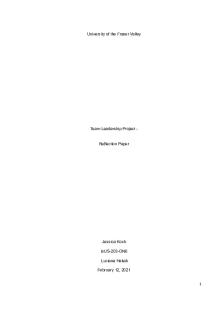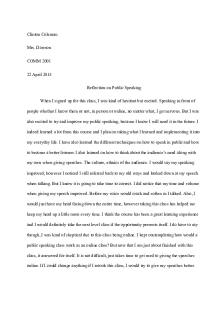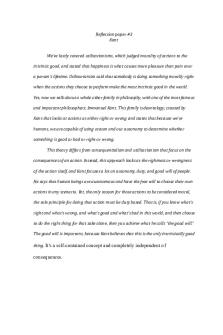Reflection Paper #1 Culture & Morality PDF

| Title | Reflection Paper #1 Culture & Morality |
|---|---|
| Author | Abi K |
| Course | Cultures Today |
| Institution | Wilfrid Laurier University |
| Pages | 3 |
| File Size | 56.5 KB |
| File Type | |
| Total Downloads | 80 |
| Total Views | 161 |
Summary
Download Reflection Paper #1 Culture & Morality PDF
Description
Reflection Paper #1 Culture & Morality Abiraamy Kanagasabey 200714750 AN 100 - A Victor Gulewitsch Chloe Zinn Wilfrid Laurier University October 9th, 2020
Throughout my life, I have always imagined how things would be if I were to be born into a different lifestyle. After reflecting on Nancy Scheper – Hughes and her argument on involvement needed by anthropologists within small groups of people I now see things differently. Seeing the conditions Others are living in I acknowledge the fact that I'm very fortunate to live in Canada alongside many great people. Hughes argues for an individual to research different types of cultures including the good, bad, and ugly. One must reflect critically on the harsh outcomes of their experiences. There are two main ideas – the first one being tribes and small groups who need help to thrive and the second one being morally and ethically engaged when dealing with these groups in order to get the best results. Her research consisted of Helping a group located in Brazil to find clean drinking water, lowering wages for the community, and then record their daily lives to figure Out possible solutions for their communities. Issues such as cultural boundaries caused her to change her approach, which created an opportunity for her to understand these communities as an anthropologist. While reading through the textbook I came to the realization of the importance of not judging someone’s culture. Trying to understand one's culture is better than trying to force your own culture upon someone. I came to this realization through living in a multicultural country such as Canada and travelling the world with my family to see how others live. Issues caused by cultural boundaries that surround many groups are important to overcome as their suffering from hunger, separation, and diseases. These can all be changed through research done by an anthropologist. Due to the fact that Canada is a multicultural country, it is extremely important to understand everyone is different as many different cultures and communities live in this country. Canadians are very much disconnected from other lifestyles, which caused the disconnect between Scheper – Hughes and the Brazilian group whom which she worked alongside with. These kinds of experiences can only be taught through live witnessing however, many individuals are not given that opportunity until later on in life. As a result of different cultural beliefs, every individual has different morals. This can be seen when Scheper – Hughes noticed women starving their infants to allow them to die “as they’re already doomed” (Robbins, 2017, p.17). However, in Canada, if that was displayed sever legal actions would be held against you as it is murder. This goes to show, the phenomenal health care system and benefits Canada provides which only makes me more thankful that I have the life I do. As I understand different cultures around the world have different cultural practices, I believe these practices should only go to a certain extent as every individual should be able to make their own choices. This thought intersects with Roon Kanwar, who is an eighteen-year-old girl who burned herself alive during the funeral held for her husband. This practice is a part of some Indian cultures however I believe it is morally and ethically wrong. Elizabeth Zechenter says, “Cultural relativist is right to contend the endorsing or rejecting some foreign custom risks imposing one's cultural prejudice on others” (Robbins,2017, p.17). In my opinion, I believe Roon Kanwar should have been given the option to not participate in this practice instead of blindly following along. As anthropologists begin their research, they face a dilemma: “should they maintain a ‘moral distance’ from those they are studying and remain ‘objective’, or should they engage in criticizing behaviour or beliefs they encounter” (Robbins, 2017, p.16). The start showcases action must occur for certain religious groups in order to be accepted and provided information.
Scheper – Hughes Acknowledged the Brazilian group didn't want her assistance as she wasn't able to help their whole community. However, as Scheper – Hughes Modified her approach to these groups they willingly provided her with information. This thought reminded me of different learning skills such as visual, hands-on, or linguistic. No matter your preference, you need to find the right path. This is what I gathered from Scheper – Hughes and I believe she applied this to her future work. In conclusion, the anthropologist must adapt to their researches needs in order to achieve the correct information for their research. I believe anthropologists going into these small villages and witnessing their practices would preserve the culture’s tradition only if an alternative route is provided. The next steps not helping these groups consist of providing safe and livable conditions while incorporating their culture. this help can be given by many individuals around the world, non-profit organizations and researchers....
Similar Free PDFs

Bev Reflection Paper 1
- 4 Pages

Reflection paper 1 - Essay
- 3 Pages

Reflection Paper #1
- 2 Pages

Ethics Reflection Paper 1
- 3 Pages

Reflection Paper #1 - Copy
- 4 Pages

Reflection Paper 1
- 6 Pages

Reflection paper 1
- 4 Pages

Reflection Paper
- 2 Pages

Reflection on Daily Culture
- 5 Pages

Reflection Paper
- 4 Pages

Reflection Paper
- 2 Pages

Reflection paper 1 - Grade: 95%
- 4 Pages

Reflection paper
- 3 Pages

Unit 1 Personal Reflection Paper
- 3 Pages
Popular Institutions
- Tinajero National High School - Annex
- Politeknik Caltex Riau
- Yokohama City University
- SGT University
- University of Al-Qadisiyah
- Divine Word College of Vigan
- Techniek College Rotterdam
- Universidade de Santiago
- Universiti Teknologi MARA Cawangan Johor Kampus Pasir Gudang
- Poltekkes Kemenkes Yogyakarta
- Baguio City National High School
- Colegio san marcos
- preparatoria uno
- Centro de Bachillerato Tecnológico Industrial y de Servicios No. 107
- Dalian Maritime University
- Quang Trung Secondary School
- Colegio Tecnológico en Informática
- Corporación Regional de Educación Superior
- Grupo CEDVA
- Dar Al Uloom University
- Centro de Estudios Preuniversitarios de la Universidad Nacional de Ingeniería
- 上智大学
- Aakash International School, Nuna Majara
- San Felipe Neri Catholic School
- Kang Chiao International School - New Taipei City
- Misamis Occidental National High School
- Institución Educativa Escuela Normal Juan Ladrilleros
- Kolehiyo ng Pantukan
- Batanes State College
- Instituto Continental
- Sekolah Menengah Kejuruan Kesehatan Kaltara (Tarakan)
- Colegio de La Inmaculada Concepcion - Cebu

